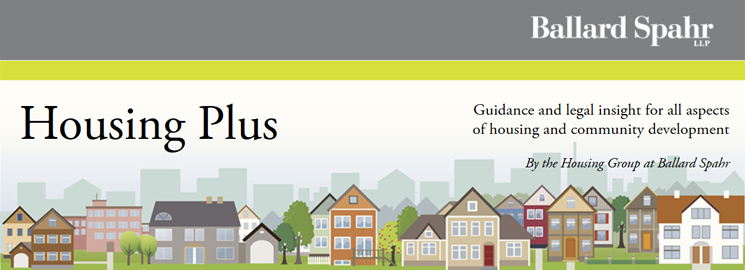
On May 15th, Ballard Spahr hosted the webinar, “HUD’s RAD Program: Lessons Learned So Far”. The panel included HUD representatives Greg Byrne and Kathie Soroka, Ivy Dench-Carter from Pennrose Properties, a private developer and property manager, Peter Engel from the Housing Authority of Baltimore City, and Amy McClain and Rania Arja, Ballard Spahr attorneys who represent lenders, housing authorities, and developers. Opening remarks were provided by Mitzie Smith-Mack and the Q&A session was facilitated by Sharon Wilson Géno, both also of Ballard Spahr.
Greg Byrne shared that HUD has completed its review of all applications in the waiting list, and has sent letters out requesting additional information, if necessary. In addition, HUD will be hosting a two-day RAD Network Training on June 4th and 5th at HUD’s DC Headquarters.
Kathie Soroka from HUD’s Office of General Counsel shared that additional guidance on resident relocation will be coming out soon, integrating requirements under the Uniform Relocation Act, Fair Housing requirements, RAD requirements, and public housing requirements. She also stated that additional HUD guidance will be coming out soon regarding RAD conversions on properties with existing Energy Performance Contracts.
HUD is working on providing recognition of lender foreclosure rights in a more standardized way. The RAD Use Agreement survives foreclosure. The RAD statute sets a preference for a “capable public entity”, followed by a secondary preference for a “capable entity” (to be determined by the HUD Secretary), to acquire the property after foreclose. There is currently discussion among HUD and lender representatives to develop a standardized form of addendum to the HUD documents to facilitate the foreclosure process in light of the RAD requirements and lender interests, but that agreement and its content are not yet finalized.
The discussion brought up a reminder that RAD projects financed with FHA-insured loans must use FHA forms, including forms for construction contracts, performance and payment bonds, and owner-architect agreements, and that there are additional FHA-specific title and survey requirements. Other requirements of the FHA program will apply to the transaction.
The question and answer session raised some helpful information and interesting issues. In response to one question from the audience, Greg Byrne explained that HUD does permit off-site transfer of subsidy under the RAD program. The Housing Authority may allocate the RAD subsidy to any non-public housing units located elsewhere. The off-site units could be existing tax-credit only units, for example. Given the resident protections required by RAD, all residents of the public housing units will be moved to the off-site units receiving the RAD subsidy.
More details and issues around the RAD demonstration program were discussed during the course of the webinar.